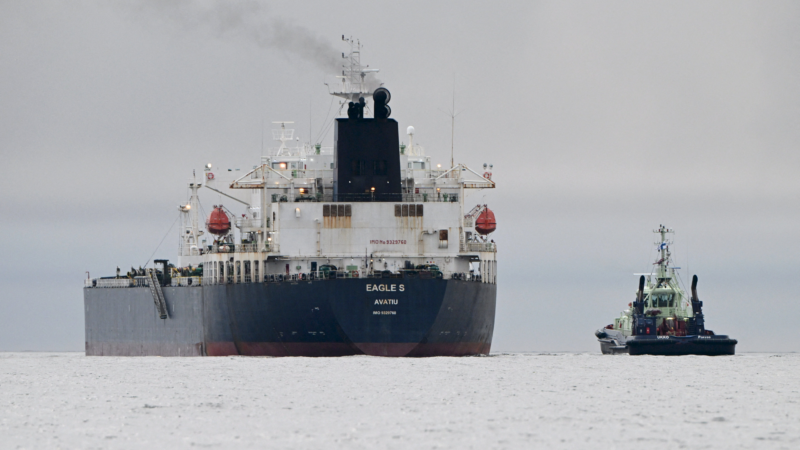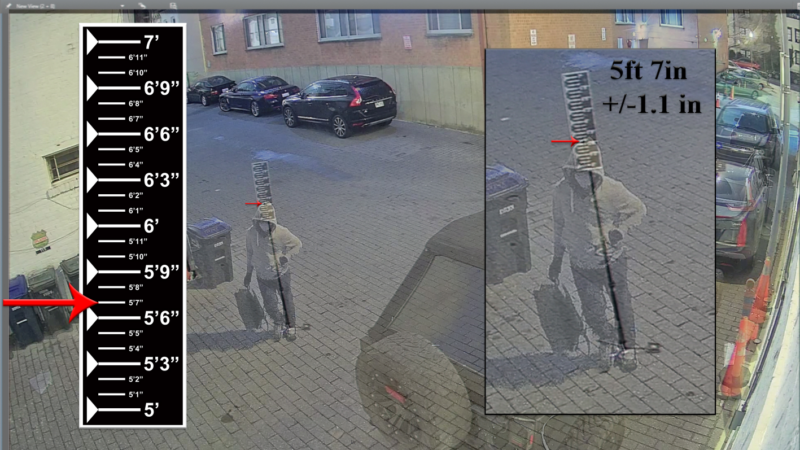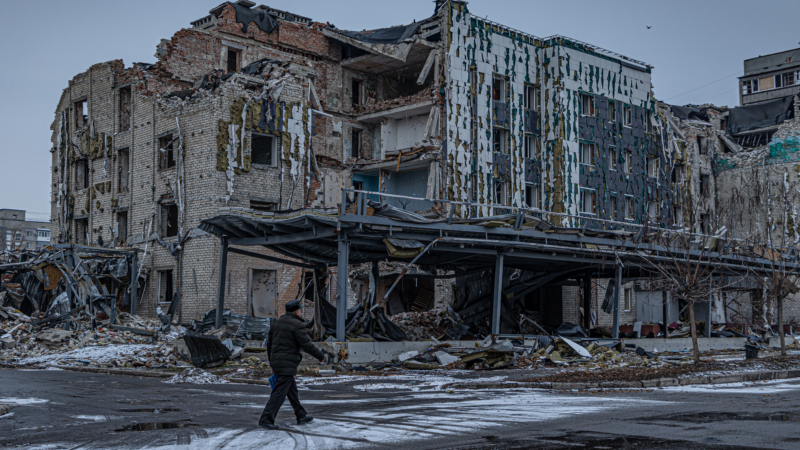What to know about Finland, Russia’s ‘shadow fleet’ and a severed undersea cable
Finnish authorities investigating a severed undersea power cable said over the weekend that they discovered a 60-mile-long anchor drag mark on the seafloor — which they say is linked to a Russia-affiliated vessel.
The Baltic Sea power cable that runs between Finland and Estonia was damaged last week, along with multiple data cables.
Authorities believe the vessel, Eagle S, is part of Russia’s “shadow fleet,” a network of ships with uncertain ownership used to evade Western oil sanctions imposed over the war in Ukraine. The ship was seized by Finland as it continues its investigation.
It’s the latest in a string of incidents that have raised alarm bells across Europe, amid fears that Russia is conducting acts of sabotage against European infrastructure in response to EU support for Ukraine.
NATO, meanwhile, has promised more military reinforcement in the Baltic Sea.
The Russian Embassy in Washington, D.C., did not immediately respond to NPR’s request for comment. Russia has denied involvement in previous similar incidents.
Here’s what we know about the severed power cable, the current investigation, and Russia’s “shadow fleet.”
How the latest incident unfolded
On Christmas Day, an undersea power cable connecting Finland and Estonia, known as the Estlink-2, was severed, cut in an area where the seabed is difficult to access naturally.
Finnish authorities detected the damage during routine monitoring and quickly launched an investigation.
Late Sunday, Finnish police chief investigator Sami Paila told Finnish National Broadcaster Yle that police discovered an anchor drag trail extended for “dozens of kilometers … if not almost 100 kilometers (62 miles),” suggesting deliberate actions.
This disruption, although having little immediate impact on services, has underscored the vulnerabilities of critical infrastructure in the Baltic Sea.
The incident also followed damage to two data cables in November and bombings of the Nord Stream gas pipelines in 2022. Investigators of those incidents have said the cables and pipelines were deliberately targeted.
The ship detained by Finland passed over the cables, investigators say
Finnish investigators have detained the Eagle S, a 70,000-ton crude oil tanker registered in the Cook Islands.
The vessel was operating in the vicinity of the cables at the time of the incident and had set off from Russia the day before. Finnish authorities said they noticed the Eagle S had slowed down as it passed over the cables at around the same time that the incident occurred.
Finland’s National Bureau of Investigation on Saturday said it was investigating the ship under criminal charges including aggravated criminal mischief and aggravated interference of communications. It also said the ship’s crew members were being questioned.
Authorities confiscated material from the ship for analysis, a process they said could take several months to complete.
European leaders condemned the incident but have yet to publicly blame Russia
European leaders have condemned the incident, emphasizing the urgency of protecting critical infrastructure.
“Undersea cables and pipelines connecting our countries across the Baltic Sea have been there for years without any major incidents nor damages,” Lauri Läänemets, Estonia’s interior minister, told NPR, adding: “It is highly unlikely, even naïve to think that 3 such incidents in just a year could be merely a coincidence.”
Läänemets was cautious about directly blaming Russia for this latest incident as Finland continues its investigation, but he did say Europe needed “to take decisive steps sanctioning Russia’s shadow fleet operating on the Baltic Sea.”
Undersea cables provide a large source of electricity to Estonia and other Baltic states. Fingrid, Finland’s electricity transmission operator, said the repair could take months and warned the cable cut risked making it “more likely that the power situation will become tight” for Estonians.
Finland and Estonia promptly called on NATO to bolster its presence in the Baltic Sea.
NATO Secretary-General Mark Rutte announced plans to enhance military operations in the region, including naval patrols.
But some accuse the EU of not being quick enough.
“We have been too slow in our action,” Marko Mihkelson, the chair of the Estonian Parliament’s Foreign Affairs Committee, told NPR on Friday, referring to the EU’s failure to respond to previous similar incidents.
In November, two fiber-optic Baltic Sea cables were severed. German officials called it sabotage and the Danish navy stopped a Chinese cargo ship that passed over both cables.
In October 2023, a Chinese ship dragged its anchor hundreds of miles, destroying undersea cables and an undersea gas line connecting Finland and Estonia. China said its ship was responsible but said it was an accident.
“We said after the NATO membership of Sweden and Finland, that the Baltic Sea is like a NATO lake. Is it? What can we do to secure critical infrastructure?” Mihkelson said, adding he would “like to see more robust action from the side of NATO.”
The European Commission has proposed targeted sanctions against Russia’s shadow fleet. These measures aim to deter future sabotage and reduce the fleet’s impact on global security and the environment.
What to know about Russia’s alleged “shadow fleet”
Russia’s shadow fleet refers to a network of older vessels used to evade Western sanctions and, allegedly, conduct covert operations. The ships take steps to sell Russian oil while concealing its origin.
These tankers often operate without Western-regulated insurance and employ tactics such as signal jamming to hide their movements. Many are registered under foreign flags to obscure their origins.
Following the European Union’s price cap on Russian oil, nearly 70% of Russia’s oil exports are now transported by these fleets, according to a European Parliament briefing.
Analysts believe the Kremlin has invested billions to expand this network, with the alleged covert operations being used to create instability across Europe.
“Russia has dramatically stepped up its game in its operations against democratic European countries,” Janne Riihelainen, a national security columnist for multiple Finnish news outlets, told NPR.
He added: “Russia is stepping up pressure against the West amid its continued support for Ukraine by trying to disrupt the lives of everyday people.”
Apple to pay $95 million to settle lawsuit accusing Siri of eavesdropping
Apple isn't acknowledging wrongdoing in the settlement, which still must be approved by a U.S. District judge. Lawyers in the case have proposed scheduling a Feb. 14 court hearing to review the terms.
2 dead and 18 injured in Southern California plane crash
Two people died and 18 were injured Thursday when a small plane crashed through the roof of a furniture manufacturing building in Southern California, police said.
Photos: Bourbon Street reopens in New Orleans after truck attack
Bourbon Street re-opened in New Orleans Thursday afternoon, more than 24 hours after Wednesday morning's attack by a Texas man driving a Ford pickup truck plowed into a crowd of New Year's revelers.
Still on the hunt, the FBI shares new details about pipe bombs placed ahead of Jan. 6
Officials are still trying to identify the person who placed bombs outside of the Democratic National Committee and the Republican National Committee offices in 2021. Now they have fresh details.
The oldest living Olympic medal winner, Ágnes Keleti, has died at age 103
Keleti, who was also a Holocaust survivor, was hospitalized in critical condition with pneumonia on Dec. 25. She died Thursday morning in Budapest, the Hungarian state news agency reported.
Ukrainian soldiers and shopkeepers hold on as Russia’s siege of Pokrovsk tightens
Ukrainian forces are fighting to hold on to the key city of Pokrovsk, in one of the fiercest battles in eastern Ukraine, but commanders admit the Russians have more troops and firepower.






